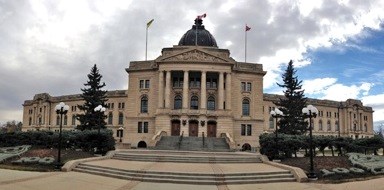The economy and trade were prime concerns for Western premiers as they met by teleconference Monday.
The teleconference included B.C. premier Christy Clark, Manitoba premier Greg Selinger, N.W.T. premier Bob McLeod and Yukon premier Darrell Pasloski. Alberta premier Rachel Notley was not able to join the call, however, due to the swearing-in of MLAs in Alberta.
“There was a focus this morning on the economy certainly,” said Premier Brad Wall, who hosted the premier’s conference.
There are “challenges and opportunities existing among the provinces and territories that constitute the Western Premiers Conference. We have a lot in common with respect to what is needed, we think, in the long term for sustainable growth in western Canada.”
Chief among the issues, Wall said in his conference call with reporters, was trade. In particular, trade with the United States.
He noted progress has been made on country-of-origin labeling, noting the United States lost in a recent World Trade Organization decision. He said the federal government has threatened to follow up with retaliation if the United States doesn’t abide by that ruling.
“We know that has worked,” said Wall. “We know that those interests in the United States that would be the target of that retaliation have talked to their legislators.” He noted a big majority of the House committee on agriculture voted to send a bill to the House repealing COOL.
The premiers have asked a letter be sent to decision makers encouraging the repeal of COOL.
As well, the premiers support trade to Asia, having signed a deal with South Korea. They also expressed support for Canada to participate in the Trans Pacific Partnership.
“The fact remains in our country that notwithstanding efforts to diversify our trade markets away from too great a dependency on the United States, that diversification is not where it needs to be.”
He said a “focus on Asia is key, specifically on TPP but also with respect to China and India.” Wall said a recent visit of Indian prime minister Narendra Modi was “holding great potential as a springboard to further progress with respect to trade with India.”
Another item discussed was internal trade, as B.C.’s Clark pointed out.
“That’s something that we as Western premiers are going to put on the national agenda and advocate for very strongly, particularly the federal government role in dealing with barriers that they have created for internal trade,” said Clark, who also praised the New West Partnership.
“Canadians want us to go forward and farther on internal trade, and not go backwards.”
The premiers cited the importance of trade in dealing with the issue of lower oil and commodity prices.
"We need to make sure that with respect to falling commodity prices that other parts of the economy are functioning well, that we can access other markets, in our case, for potash. That agriculture is strong," said Wall.
Clark said the “way to protect against low commodity prices is to make sure you have both a diverse economy and grow your technology sector, grow your green energy sector, as well as agriculture and forestry and mining, in our case, mining and LNG (liquefied natural gas)”.
She called opening up markets to Asia “the answer, I think, to low commodity markets, because in a country where we are resource rich and still proudly resource dependent, we have to make sure we are diversifying those markets so we can protect individual citizens.”
Other issues discussed included infrastructure, with the premiers calling on the federal government to do more on that issue.
“We need a very significant investment in infrastructure,” said Wall.
“We know the provinces and territories are going to ask to be there, municipalities are asking to be there, but we had a discussion around importance of infrastructure and the need to have federal government involved in this regard.”


.png;w=120;h=80;mode=crop)

